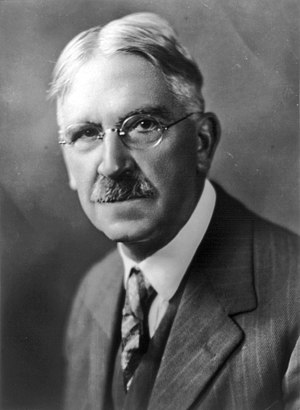
Failure is instructive. The person who really thinks learns quite as much from his failures as from his successes.
Share this quote:
a problem well put is half solved.
Share this quote:
To find out what one is fitted to do, and to secure an opportunity to do it, is the key to happiness.
Share this quote:
For in spite of itself any movement that thinks and acts in terms of an ‘ism becomes so involved in reaction against other ‘isms that it is unwittingly controlled by them. For it then forms its principles by reaction against them instead of by a comprehensive, constructive survey of actual needs, problems, and possibilities.
Share this quote:
Were all instructors to realize that the quality of mental process, not the production of correct answers, is the measure of educative growth something hardly less than a revolution in teaching would be worked.
Share this quote:
As we have seen there is some kind of continuity in any case since every experience affects for better or worse the attitudes which help decide the quality of further experiences, by setting up certain preference and aversion, and making it easier or harder to act for this or that end.
Share this quote:
A genuine purpose always starts with an impulse. Obstruction of the immediate execution of an impulse converts it into a desire. Nevertheless neither impulse nor desire is itself a purpose. A purpose is an end-view. That is, it involves foresight of the consequences which will result from acting upon impulse.
Share this quote:
Traditional education tended to ignore the importance of personal impulse and desire as moving springs. But this is no reason why progressive education should identify impulse and desire with purpose and thereby pass lightly over the need for careful observation, for wide range of information, and for judgment is students are to share in the formation of the purposes which activate them
Share this quote:
A single course of studies for all progressive schools is out of the question it would mean abandoning the fundamental principle of connection with life-experiences.
Share this quote:
Strait-jacket and chain-gang procedures had to be done away with if there was to a chance for growth of individuals in the intellectual springs of freedom without which there is no assurance of genuine and continued normal growth.
Share this quote:
Every great advance in science has issued from a new audacity of imagination.
Share this quote:
Scientific principles and laws do not lie on the surface of nature. They are hidden, and must be wrested from nature by an active and elaborate technique of inquiry.
Share this quote:
Democracy is a way of life controlled by a working faith in the possibilities of human nature. Belief in the Common Man is a familiar article in the democratic creed. That belief is without basis and significance save as it means faith in the potentialities of human nature as that nature is exhibited in every human being irrespective of race, color, sex, birth and family, of material or cultural wealth. This faith may be enacted in statutes, but it is only on paper unless it is put in force in the attitudes which human beings display to one another in all the incidents and relations of daily life. To denounce Nazism for intolerance, cruelty and stimulation of hatred amounts to fostering insincerity if, in our personal relations to other persons, if, in our daily walk and conversation, we are moved by racial, color or other class prejudice; indeed, by anything save a generous belief in their possibilities as human beings, a belief which brings with it the need for providing conditions which will enable these capacities to reach fulfillment. The democratic faith in human equality is belief that every human being, independent of the quantity or range of his personal endowment, has the right to equal opportunity with every other person for development of whatever gifts he has.
Share this quote:
Like the soil, mind is fertilized while it lies fallow, until a new burst of bloom ensues.
Share this quote:
Nothing is more tragic than failure to discover one’s true business in life, or to find that one has drifted or been forced by circumstance into an uncongenial calling.
Share this quote:
I feel the gods are pretty dead, though I suppose I ought to know that however, to be somewhat more philosophical in the matter, if atheism means simply not being a theist, then of course Im an atheist.[Letter to Max Otto]
Share this quote:
Every one has experienced how learning an appropriate name for what was dim and vague cleared up and crystallized the whole matter. Some meaning seems distinct almost within reach, but is elusive; it refuses to condense into definite form; the attaching of a word somehow (just how, it is almost impossible to say) puts limits around the meaning, draws it out from the void, makes it stand out as an entity on its own account.
Share this quote:
We rarely recognize the extent in which our conscious estimates of what is worth while and what is not, are due to standards of which we are not conscious at all. But in general it may be said that the things which we take for granted without inquiry or reflection are just the things which determine our conscious thinking and decide our conclusions.
Share this quote:
Collateral learning in the way of formation of enduring attitudes, of likes and dislikes, may be and often is much more important than the spelling lesson or lesson in geography or history that is learned.
Share this quote:
The most important attitude that can be formed is that of desire to go on learning.
Share this quote: